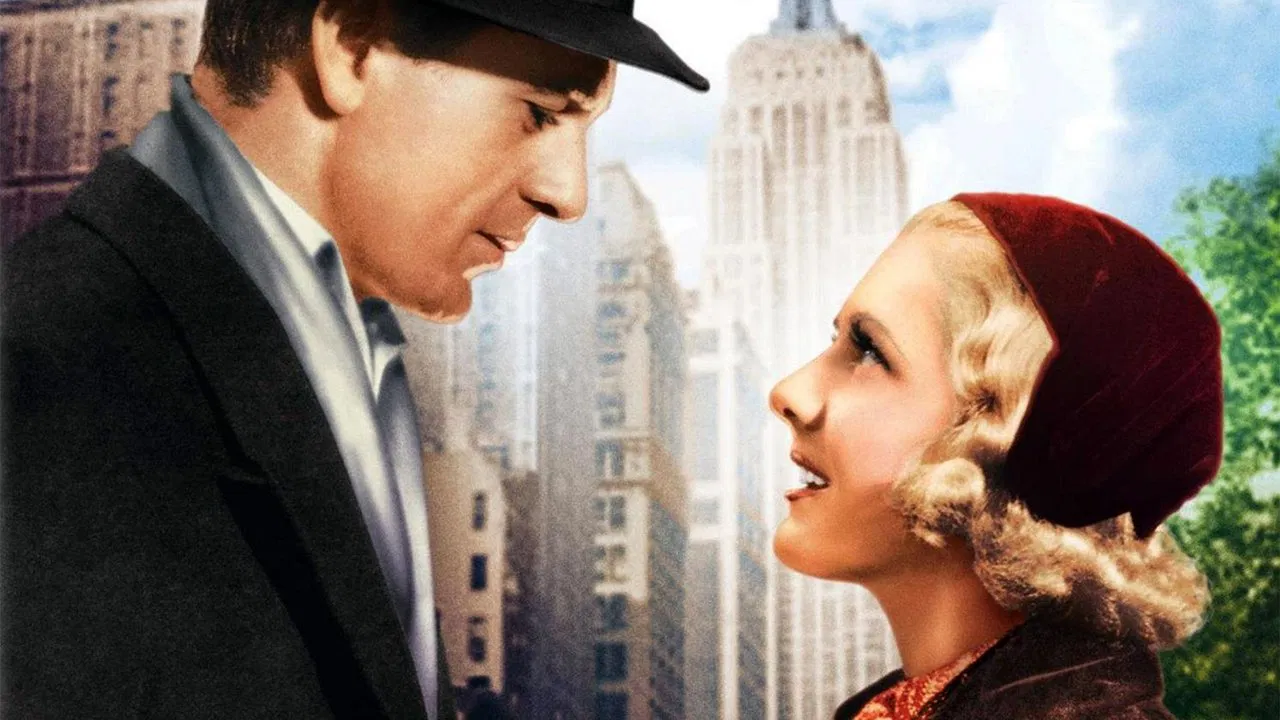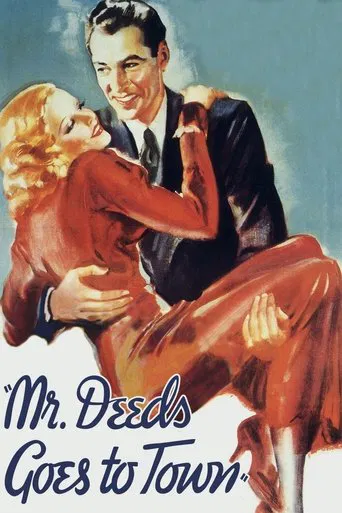

Frank Capra's "Mr. Deeds Goes to Town" is one of the best films he ever directed along with "It Happened One Night" (1934), and "It's a Wonderful Life" (1946) the one thing in common that all three of these films have in common besides being great pieces of work, the other thing is that two of them being this one and "It Happened One Night" were so funny that I couldn't stop watching it. The main character of this movie is a man named Longfellow Deeds (Gary Cooper) who is a poet from the state of Vermont who also happens to be a tuba player in his local town band. Deeds is living a normal private life until he comes to New York City he meets a woman named Babe Bennett (Jean Arthur) who both happen to fall in love with one another. Like a bunch of other great romance movies the chemistry between Gary Cooper (who received his first Oscar nomination for his performance) and Jean Arthur is so perfect that it will make you think of the chemistry that Clark Gable and Claudette Colbert had in their Oscar winning turns in "It Happened One Night" and as a result of both films Frank Capra won his first two best director Oscars. But now back to the story, as soon as Deeds arrives in New York during his time there he makes thousands of dollars while working with a bunch of city slickers, which is all that I will tell in this review because I don't want to give away anymore major details. This movie also ranks among the best romance movies ever made besides "It Happened One Night", it ranks along with, "Out of Africa" (1985), "Ball of Fire" (1945), "The Apartment" (1960), ""Heaven Can Wait" (1978), as well as "Pride and Prejudice" (2005) among many others. Cooper gives one of the best performances of his career in this movie, as well as Jean Arthur which now that i'm writing this review I couldn't think of anyone better than to play their characters than they were with their performances in the movie. Movies like this one are the reasons why Frank Capra was such a great director, and a very important film-maker and that his movies are still relevant today. It was Capra himself that once said "There are no rules in film-making, only sins, and the cardinal sin is dullness." Which this is a quote that is still relevant in movie making today and believe me even bad film-makers like Dennis Dugan can take some comedy lessons from a comedy genius like Capra or Billy Wilder. Not only is this movie one of the best romance movies ever made it is also one of the funniest movies that I have ever seen, and watching this movie is a very funny experience that all movie lovers will cherish.
... View MoreI'll admit that it took me a while for Gary Cooper to grow on me as an actor and to see his appeal under his minimalist, low key style of acting; but eventfully I got it. It's been said Cooper's face was the map of America; so why in under God did they cast Adam Sandler in a remake of Mr Deeds Goes to Town?Mandrake Falls is a town full of oddballs, and the naive but not a total dunce Longfellow Deeds comes off as a weirdo to the city dwellers who are fascinated by his behaviour and start mocking him. Mr Deeds Goes to Town certainly highlights the divide between city slickers and small town folk; this is particularly evident in the scene in which Deeds, himself a poet meets a group of distinguished poets in restaurant and is appalled by their snobbery and elitism to the point that he beats them up. Likewise the film also features Charles Lane as a lawyer, the inspiration for the The Simpsons blue haired lawyer. In an example of the darker side of Capra's films, Mr Deeds Goes to Town is a cynical look as society and the media as a whole ("Why do people seem to get pleasure out of hurting each other, why don't they try helping each other once in a while?"). Multiple people are out to snag Deed's fortune while the media is out constantly pursuing him due to his odd but ultimately harmless behaviour; the media manipulating how a person is seen by the public. Mr Deeds is a man who became famous for inheriting a fortune, in other words he's famous for being famous and the newspapers appear to have nothing better to do than report on his escapades such as feeding donuts to a horse; relevant to today's celebrity culture.With the scene in the park in which Babe plays a set of improvised drums and Deeds sings humoresque. Capra didn't want to include it as he thought it was too sappy but Jean Arthur insisted it remain. Capra of all people thought it was too sappy?! But ah Capra sentiment, it never fails to move me.The sanity hearing at the end of the film is pure movie fantasy; I doubt in real life someone could be classified insane on such so called evidence. In a demonstration of Cooper's ability as one of the best actors when it comes to giving a rousing speech or monologue, he talks about the silly quirks we all have. Although the likes of "o" filling or knuckle cracking seems rather trivial, I'm always left with the impression that the movie is making a statement on society's treatment of those who don't fully "fit in" or adhere to conformity and asks the question; who is truly "normal"?
... View MoreLongfellow Deeds (Gary Cooper) is a beloved tuba-playing greeting card writer in the tiny Mandrake Falls in Vermont. When his forgotten banker uncle Martin Semple dies, he is the sole benefactor of the $20 million fortune. His uncle's scheming lawyer John Cedar (Douglass Dumbrille) brings him back to NYC and tries to hide his firm's stealing by getting him to sign the power of attorney. Ex-newspaperman Cornelius Cobb (Lionel Stander) tries valiantly to keep him out of bad PR trouble. Everybody is trying to take advantage of him thinking he's a small town simpleton. He wants to give away the fortune and rescue a damsel in distress. Ace reporter Babe Bennett (Jean Arthur) insinuate into his life by pretending to be poor girl Mary Dawson fainting in front of him. She starts writing articles giving him the nickname "Cinderella Man" which he hates.Gary Cooper is the everyman nice guy. He has a childlike wonder and a upstanding persona while maintaining a sincerity in his performance. Jean Arthur is terrific as a real broad and the heart winning love. Lionel Stander takes a consolation prize for his hard talking character. It's a simple premise that Capra uses to elevate the nobility of the common man. It does turn serious which is a bit jarring in tone. It doesn't have the same resonance as when it was made during the Great Depression.
... View More*** This review may contain spoilers ***Capra just knew how to do it. The 30s were his decade, and by the end of it, he had 3 Academy Awards to call his own (and may even have won one more for Mr Smith, if it wasn't for Gone with the Wind). Everything about this movie is perfect. The pacing, the dialogue, the acting, the plot.Gary Cooper is wonderful as the idealistic small town tuba player who inherits a small fortune and has to move to the big city, where he'll soon become ''the victim of every conniving crook in town''. Like most of Capra's heroes, he's a playful man-child who slides down bannisters, chases fire engines and grins on hearing echoes. And although he's not as naive as the lawyer Mr Cedar initially hopes, he's genuinely confused by the cynic attitudes of the people around him. Cooper plays beautifully, is convincingly bashful, funny and heartbroken over the course of the film, and really deserved his Academy Award (the close-up of Longfellow's reaction on hearing of Babe's betrayal is especially praiseworthy).But having said that, Jean Arthur's performance is equally brilliant as the cynic reporter who worms her way into Deeds's confidence and writes insulting articles about the ''Cinderella Man'' behind his back, only to fall in love with him herself. Babe's transformation is utterly credible, and beautifully done, so you can't help but root for her in the end.The rest of the cast is superb too, of course, particularly Lionel Stander, George Bancroft and Ruth Donnelly.Mr Deeds is Capra's first film where he consciously tries to bring across his ideas to the public, ideas which champion the little man, the insignificant man, the individualist.I first saw this at the age of 14, and it just blew me away, because it's just so much more sophisticated than the majority of the comedies produced today (although Mr Deeds can't really be classified as just a comedy – that's another wonderful thing about it.) Anyway, it was this film that got me into all the classics of the 30s and 40s, and then eventually, into all kinds of films in general.
... View More